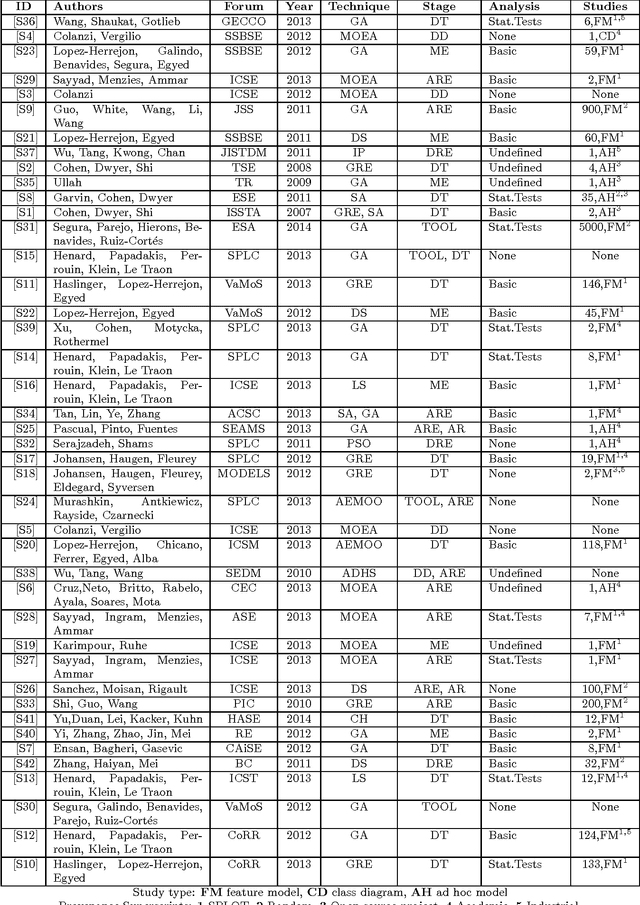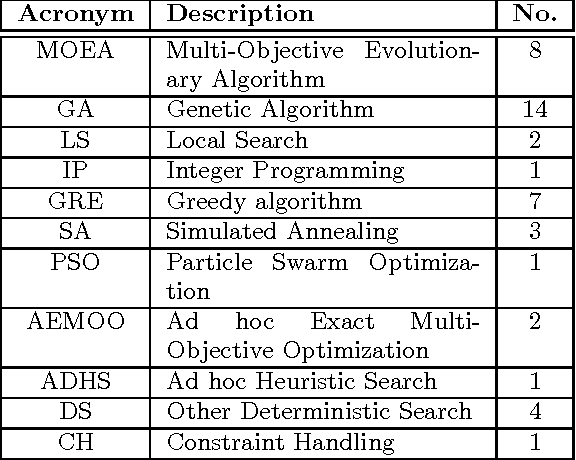Javier Ferrer
CMSA algorithm for solving the prioritized pairwise test data generation problem in software product lines
Feb 07, 2024Abstract:In Software Product Lines (SPLs) it may be difficult or even impossible to test all the products of the family because of the large number of valid feature combinations that may exist. Thus, we want to find a minimal subset of the product family that allows us to test all these possible combinations (pairwise). Furthermore, when testing a single product is a great effort, it is desirable to first test products composed of a set of priority features. This problem is called Prioritized Pairwise Test Data Generation Problem. State-of-the-art algorithms based on Integer Linear Programming for this problema are faster enough for small and medium instances. However, there exists some real instances that are too large to be computed with these algorithms in a reasonable time because of the exponential growth of the number of candidate solutions. Also, these heuristics not always lead us to the best solutions. In this work we propose a new approach based on a hybrid metaheuristic algorithm called Construct, Merge, Solve & Adapt. We compare this matheuristic with four algorithms: a Hybrid algorithm based on Integer Linear Programming ((HILP), a Hybrid algorithm based on Integer Nonlinear Programming (HINLP), the Parallel Prioritized Genetic Solver (PPGS), and a greedy algorithm called prioritized-ICPL. The analysis reveals that CMSA results in statistically significantly better quality solutions in most instances and for most levels of weighted coverage, although it requires more execution time.
* Preprint of the submitted version of the article in Journal of Heuristics
BIN-CT: Urban Waste Collection based in Predicting the Container Fill Level
Jul 03, 2018



Abstract:The fast demographic growth, together with the concentration of the population in cities and the increasing amount of daily waste, are factors that push to the limit the ability of waste assimilation by Nature. Therefore, we need technological means to make an optimal management of the waste collection process, which represents 70% of the operational cost in waste treatment. In this article, we present a free intelligent software system, based on computational learning algorithms, which plans the best routes for waste collection supported by past (historical) and future (predictions) data. The objective of the system is the cost reduction of the waste collection service by means of the minimization in distance traveled by any truck to collect a container, hence the fuel consumption. At the same time the quality of service to the citizen is increased avoiding the annoying overflows of containers thanks to the accurate fill level predictions performed by BIN-CT. In this article we show the features of our software system, illustrating it operation with a real case study of a Spanish city. We conclude that the use of BIN-CT avoids unnecessary visits to containers, reduces the distance traveled to collect a container and therefore we obtain a reduction of total costs and harmful emissions thrown to the atmosphere.
A Hitchhiker's Guide to Search-Based Software Engineering for Software Product Lines
Jun 11, 2014



Abstract:Search Based Software Engineering (SBSE) is an emerging discipline that focuses on the application of search-based optimization techniques to software engineering problems. The capacity of SBSE techniques to tackle problems involving large search spaces make their application attractive for Software Product Lines (SPLs). In recent years, several publications have appeared that apply SBSE techniques to SPL problems. In this paper, we present the results of a systematic mapping study of such publications. We identified the stages of the SPL life cycle where SBSE techniques have been used, what case studies have been employed and how they have been analysed. This mapping study revealed potential venues for further research as well as common misunderstanding and pitfalls when applying SBSE techniques that we address by providing a guideline for researchers and practitioners interested in exploiting these techniques.
 Add to Chrome
Add to Chrome Add to Firefox
Add to Firefox Add to Edge
Add to Edge